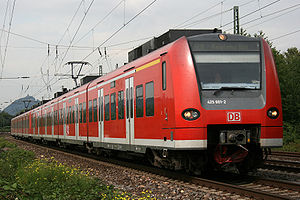DBAG Class 425
| DBAG Class 425/435 and 426 | |
|---|---|
 | |
| Manufacturer | Bombardier, Siemens and DWA (consortium) |
| Constructed | 1999 - 2008 |
| Number built | 249 / 43 |
| Specifications | |
| Train length | 67.5 m (221 ft 5 in) / 36.49 m (119 ft 9 in) |
| Wheel diameter | 850 mm (33.46 in) |
| Wheelbase | Jacobs bogie: 2,700 mm (8 ft 10+5⁄16 in) |
| Maximum speed | 160 km/h (99 mph) |
| Weight | 114 t / 63.2 t (62.2 long tons; 69.7 short tons) |
| Traction system | Electric |
| Traction motors | 8 x 1TB1724 0GA02 |
| Power output | 425: 2,350 kW (3,150 hp) / 426: 1,175 kW (1,576 hp) |
| Tractive effort | BR 425: 140 kN / BR 426: 70 kN |
| Electric system(s) | 15 kV 16.7 Hz AC (Germany) 25 kV 50 Hz AC (Malaysia) |
| Current collector(s) | Pantograph |
| UIC classification | Bo'(Bo')(2')(Bo')Bo' resp. Bo'(A+A)'(2')(A+A)'Bo' (425) Bo'(2')Bo' (426) |
| Track gauge | 1,435 mm (4 ft 8+1⁄2 in) standard gauge |
| Notes/references | |
| Class 425 nickname: "Quietschie" Class 426 nickname: "Babyquietschie" and "Strawberry basket" | |
The Class 425 and Class 426 EMUs are a class of electric multiple units built by a consortium of Siemens, Bombardier and DWA, and are operated by DB Regio in Germany. They are essentially the same vehicle design, but the Class 425 EMU consists of four carriages, whereas the Class 426 EMUs only have two carriages.

The class 425 has been produced in HO scale by Brawa and N scale by Kato Precision Railroad Models.
Description
[edit]It is a high-powered, light-weight vehicle with high acceleration for short- and medium-distance services with frequent stops. The aluminium superstructure was built as flat as possible, both to minimize drag and to ease automated cleaning. The acceleration is achieved by distributing traction motors among eight of the train's ten axles including two of the three jacobs bogies.
It is based on the Class 423 design, but lacks a third set of doorways in the centre of each car.
See also
[edit]- Express Rail Link, a Malaysian railway line which uses trains derived from the ET 425
- NS Sprinter Lighttrain, a Dutch regional train derived from the ET 425

